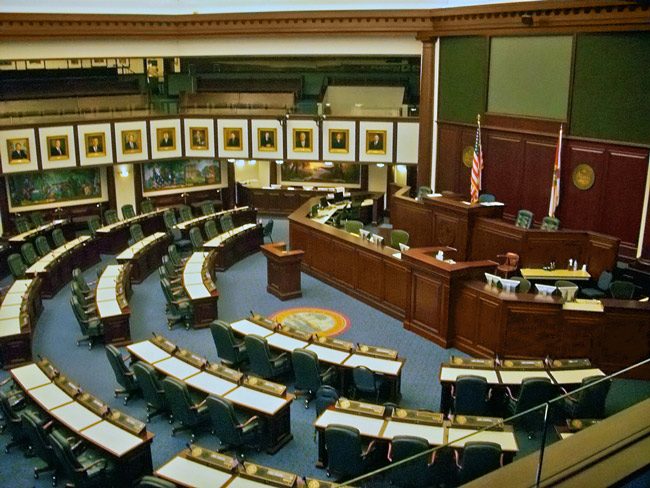
A broad proposal aimed at curbing local business regulations advanced in a House subcommittee Thursday, despite criticism that it could block ordinances that prohibit “puppy mills” or the regulation of fertilizer use near waterways.
The Republican-dominated House Business & Professions Subcommittee voted 9-5 along party lines to approve the measure (HB 3), which seeks to eliminate existing local business regulations as of July 1, 2021 and prevent new regulations.
The bill also would lead to the state largely having control of the regulation and licensing of professions — a concept known as state “preemption” of local authority.
The bill would allow local governments to maintain regulations but would impose strict conditions. For example, the regulations would have to be approved by supermajorities of the local governing boards and would have to be reauthorized every two years.
Bill sponsor Michael Grant, R-Port Charlotte, said a driving force for the proposal is a recent move by Key West to ban suntan lotions that contain the chemicals oxybenzone or octinoxate because of worries that the substances harm coral.
“That is a concern across the state, you cannot sell a particular best-named brand of sunscreen lotion in Key West because of a concern they have for an environmental issue, whether that’s real or not,” Grant said. “Somebody told me today you’d need a half-a-billion people to jump in the ocean, all slathered in sunscreen lotion, to have an impact on the reef.”
Rep. Ramon Alexander, D-Tallahassee, said in voting against the proposal that he supports “home rule,” noting rural communities have different issues from urban areas. Also, coastal communities could require different measures for hurricane safety from inland regions.
However, Rep. Randy Fine, R-Palm Bay, said people may have business interests or property in communities where they do not live. That leaves them unable to vote on local issues.
“I think many issues, where they affect beyond the borders of a city or affect beyond the borders of a county, whether it’s watershed issues or Uber (transportation issues) as we’ve dealt with in the past, those issues are best resolved here,” Fine said.
Two Republicans who voted for the bill expressed a desire to tweak it.
Rep. David Smith, R-Winter Springs, said he had been advised the measure could affect efforts to fight animal cruelty, as about 60 local governments ban or regulate pet-breeding facilities, described by critics as “puppy mills.”
Grant said he’s willing to listen to concerns about the bill. But he doesn’t want to overhaul the proposal, which must pass two more committees before it could go to the House floor during the legislative session that starts March 5.
The measure is backed by the Florida Retail Federation, Associated Industries of Florida and the Florida Chamber of Commerce. A Senate version has not been filed.
However, the proposal has drawn widespread opposition from city and county governments, environmental organizations, unions and civil- rights groups.
David Cullen, a lobbyist for the Sierra Club, said state preemption of local authority makes sense when it offers a “floor below which no body is allowed to fall.” However, Grant’s proposal “makes a ceiling over which no locality is able to improve its environmental situation,” Cullen said.
“With respect to the Indian River Lagoon, there has been considerable concern about septic tanks and leakage into the lagoon,” Cullen said. “I would note this body (the Legislature) has been unable for years to pass a simple septic-tank inspection program. … We think it should be done at the state level, but to date it has not.”
Kurt Spitzer, a lobbyist for the Florida Stormwater Association, urged lawmakers to be cautious, noting that changes could affect local ordinances that are tougher than state requirements on issues such as nutrient management and setbacks between septic tanks and waterways.
Rich Templin, a lobbyist for the Florida AFL-CIO, argued the proposal is designed to shift power from local residents who support regulations to lobbyists for business interests in Tallahassee.
“What is happening here is an ideology and the use of a process to force that ideology on everyone across the state of Florida regardless of the nature of their community,” Templin said.
–Jim Turner, News Service of Florida





























Michael Cocchiola says
This is what Republicans do…preach democracy and then disembowel it. We know Paul Renner (R – Palm Coast) favors the complete elimination of local control, so he will push this bill through the House.
Do you want to give up your right as a citizen to control your community? Vote Republican.
Jan says
Soon we will be needing permission from the state to go to the bathroom!
Don’t forget SB 82 – this one takes away local control, too. It allows people to grow vegetables gardens in their front yard. Not sure I want a corn field in my neighbor’s front yard.
And, there is SB 824 and HB 987. These onerous bills both eliminate any local control over OCCUPANCY in short-term rentals at the local level. Nor can a local community “require the licensing or inspection of a vacation rental.”
Was just looking at a house for sale in Orlando – 11 bedrooms; 10.5 baths. Holds 24 people. Is this what we want in our residential neighborhoods? It is zoned single-family.
Should the all-powerful “Oz” in Tallahassee dictates what is best for each community? Guess who loves these bills? Big business and the very powerful short-term rental industry, such as FLVRMA (Florida Vacation Rental Managers Association).
If you feel “home rule,” which is presently enshrined in the Florida Constitution, is a good thing, you better contact your local representatives, Senator Hutson and Representative Renner, and pronto. These bills, if passed (and some have already moved out of the first committee), are effective July 1, 2019. Time is running out to make your feelings known. Home rule makes the best rules.